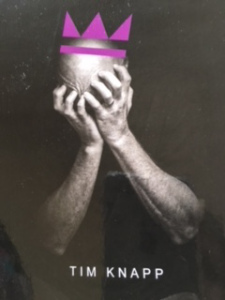 Finding Tim Knapp was akin to finding a child I had given up at birth decades ago. I felt an uncanny level of connection when we met, via email, five years ago. Tim’s mother had seen me in an interview on 100 Huntley St. in which I talked about my lengthy season of spiritual dryness. She emailed me with a link to her son Tim’s blog.
Finding Tim Knapp was akin to finding a child I had given up at birth decades ago. I felt an uncanny level of connection when we met, via email, five years ago. Tim’s mother had seen me in an interview on 100 Huntley St. in which I talked about my lengthy season of spiritual dryness. She emailed me with a link to her son Tim’s blog.
When I finally clicked in, I found a soul mate. A fellow struggler. An overcomer. A gutsy, honest, back-from-the-grave Christ follower who didn’t have it all figured out. Yet. Or ever. Like me, he was tired of glibness, formulas and pat answers. But he wasn’t tired of Jesus.
I emailed Tim, introduced myself and said, keep writing! After you read Tim’s soon-to-be released book Dry Bones: a crisis of faith, you’ll understand why.
Tim got off to a great start in life. When he was a teen, he had to be up early to deliver newspapers. “Every morning as I crept down the hall before sunrise, I would find my father on his knees. With elbows on the couch and his face buried in his hands, he physically and spiritually pressed into a place of communion with the Lord. His consistent pursuit of the Father modeled for me a life of grateful surrender. I didn’t realize it at the time but each morning as I tiptoed past my kneeling father a little bit of Jesus rubbed off on me.”
But, as we all know, many runners start the race and only one takes home the prize. Typically we read the winner’s books and gobble up their secret(s) in three keys or seven habits or 12 steps or 50 ways and believe them when they assure us, “if I can win, you can too!”
The truth is a few of us “can” but lots of us “can’t”, not to mention those of us who won’t even try because we already tried and failed and are dragging along too much baggage, or barricaded behind walls of self protection, or paralyzed by fear.
So what about the rest of us? The ones who start the race and come in third or 25th or dead last? The ones who stumble and fall and are not able to get up and continue running? What we need is one good reason to keep running. We know the odds are against us so we need encouragement to stay the course, or to get back up, rejoin the race, and finish well.
Dry Bones holds that one good reason and that encouragement. A runner who was sidelined by some unfamiliar terrain, tripped up by fellow runners he thought were on the same team, and flattened by unexpected storms writes it. Thanks to a pursuing God, a loving family that never lost faith in him, and fellow runners who refused to leave him in the ditch, Tim found one good reason to get back on track.
“Before my journey into disillusionment my lifelong desire was to be used of God in ministry. That’s was my hunger, my heart’s cry. And I won’t lie…I wanted to be the guy up front. I wanted to be a ‘man of faith and power’ that everybody looks to with wonder and respect. I wanted to be a powerful leader who slayed giants and commanded armies. I wanted to be a David. God had other ideas.”
Tim reveals that his journey through wilderness had a refining, redemptive, and re-directing purpose. He discovered that while he tried, and failed, to become a David, God was calling him to be a Jonathan. That was his real purpose. That was his one good reason. His role as a Jonathan is to find disillusioned “Davids” and help restore them.
The world could use a lot more Jonathans! I have a few Jonathans in my life and without them, I could not have accomplished anything. They pray, they encourage, they come alongside when needed, they love, they support, they meet me when I am in hiding and lead me out, they are a friend in good times and bad, they have influence and put in a good word for me, and so much more.
Dry Bones is the best book I have ever read on spiritual wilderness, including mine. It has forehead slapping insights that made we wish I had thought of that, the main one being Tim’s unpacking of the true meaning of disillusionment. He starts by differentiating between disillusionment and discouragement. As a 10-year veteran of spiritual wilderness (while married to a minister) I greatly appreciated this differentiation. “Disillusionment is something deeper. Stronger. More sinister. [It] does not let up. It does not yield to reason and it does not respond to social media memes. Disillusionment cannot be outwaited or outwilled.” Amen!
Tim discovered three precursors to disillusionment, two of which I had never thought of: hunger, illusionment, and adversity. Hunger is “a deeply rooted desire for purpose and significance.” Yup! I certainly had that! Adversity is “the experience of a setback.” Oh yeah! Been there, done that, still have the stretch marks. But illusionment? Besides the fact that it’s not a word in the English lexicon, what is that exactly? Are you saying God was, is, an illusion?
Tim’s dissection of the word disillusioned holds profound insights. It means “to be dis-illusioned, to be delivered from an illusion.” Tim explains that in order for one to be delivered from an illusion, one first has to have an illusion. What is an illusion? In short, it is a lie. “God is not the illusion people fall for…. It is in the development of our understanding about God and ourselves that illusions begin to form.” In other words it is not God that is the lie but it is my understanding of Him and His ways that is flawed.
Tim illustrates this concept with the very illusion (he calls them mirages) I once held so dearly; the illusion that knocked me out of the race and mired me in sand for many years: “If I serve God faithfully I will not suffer.” That was a lie (illusion) I believed, so when adversity struck and I suffered, I became disillusioned. “Help! I’ve lost my faith!” I cried to my pastor husband from my wilderness position. Speaking a powerful truth I did not understand for years, he was agreeing in principle with Tim Knapp when he replied, “You haven’t lost your faith, you’re finding it.” In other words, I needed to shake of the illusions and lies I believed and find the real God and base my life on His truth.
Tim is honest, transparent, and real. His writing is beautiful, words laser-focused to convey exact intent. Tim’s willingness to share his failures, fears, and flaws make him, his God, and His truth so accessible to all of us, not just the “best” runners. His humility sprinkled with humour will keep you reading and hi-liting and tweeting and sharing. Maybe, like I did, you will discover your inner Jonathan, and the one good reason you needed to get you going again.
(the above excerpt is the Foreword I was honoured to write for Tim’s upcoming book Dry Bones.)
Share this:
- Share





